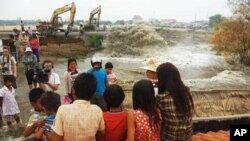The controversial development of Boeung Kak lake saw a groundbreaking ceremony on Monday, despite months or even years of protest from villagers who said they didn’t agree with a company buyout or resettlement plans.
The development company, Shukaku, Inc., which is owned by a ruling party senator, held its groundbreaking ceremony even as Phnom Penh authorities announced they would not consider a proposal by villagers to have a portion of the development set aside for them.
The ceremony marked a defeat for residents who have helplessly watched Shukaku pump fill from the bottom of the Tonle Sap into the lake, sending a rising tide of water into neighborhoods and replacing a massive body of fresh water in the north of the capital with sand.
Steadily evicted, bought out or flooded from their homes, angry residents have made numerous protests in front of City Hall and most recently filed complaints to the US Embassy, the EU and the British Embassy.
“I’m disappointed in the local authorities, for we have always believed in them to solve this land dispute for us,” said Su Sophal, a 33-year-old resident of the lakeside community. “But now the city has denied my proposal. I have no belief left in the city. I do not know that I can depend on someone to help solve this problem.”
At the groundbreaking ceremony, Phnom Penh Governor Kep Chuktema said the city had not made leadership mistakes, but he acknowledged there remained complications for villagers who refuse to leave.
“We will continue to solve some remaining problems with the residents at Boeung Kak lake,” he said. “My officials and I have not done anything wrong from the principle of government.”
Lao Van, a representative of Shukaku, said at the ceremony the company had followed its development plan since 2007.
“The master plan for Boeung Kak development includes a trade center, a modern supermarket, conference hall, entertainment, nightclub, hotel, university, hospital, residences, pleasant and attractive places and infrastructure,” he said.
Such plans were little consolation for villagers like Pol Srey Pov, 36, who said she considered herself a legal landholder whose rights were violated by the city’s 99-year-lease with the developer. She and others had hoped to have a plot of land 4 meters by 16 meters on some 15 hectares of the 133-hectare development.
“The city develops with the rich,” she said. “But we are poor.”




